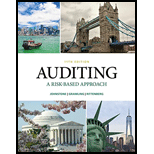
Auditing: A Risk Based-Approach (MindTap Course List)
11th Edition
ISBN: 9781337619455
Author: Karla M Johnstone, Audrey A. Gramling, Larry E. Rittenberg
Publisher: Cengage Learning
expand_more
expand_more
format_list_bulleted
Question
Chapter 8, Problem 21CYBK
To determine
Introduction: A Control deviation is used for evaluating the sample when auditor cannot perform appropriate alternative procedures for the items.
To Select: State whether the given condition is true or false.
Expert Solution & Answer
Want to see the full answer?
Check out a sample textbook solution
Students have asked these similar questions
Cost Account
Financial Accounting Question need help
Do fast answer of this general accounting question
Chapter 8 Solutions
Auditing: A Risk Based-Approach (MindTap Course List)
Ch. 8 - Prob. 1CYBKCh. 8 - Prob. 2CYBKCh. 8 - Prob. 3CYBKCh. 8 - Prob. 4CYBKCh. 8 - Prob. 5CYBKCh. 8 - Prob. 6CYBKCh. 8 - Prob. 7CYBKCh. 8 - Prob. 8CYBKCh. 8 - Prob. 9CYBKCh. 8 - Prob. 10CYBK
Ch. 8 - Prob. 11CYBKCh. 8 - Prob. 12CYBKCh. 8 - Prob. 13CYBKCh. 8 - Prob. 14CYBKCh. 8 - Prob. 15CYBKCh. 8 - Prob. 16CYBKCh. 8 - Prob. 17CYBKCh. 8 - Prob. 18CYBKCh. 8 - Refer to Exhibit 8.6. Assume a 5% risk of...Ch. 8 - Prob. 21CYBKCh. 8 - Prob. 22CYBKCh. 8 - Prob. 23CYBKCh. 8 - Prob. 24CYBKCh. 8 - Prob. 25CYBKCh. 8 - Prob. 26CYBKCh. 8 - Prob. 27CYBKCh. 8 - Prob. 28CYBKCh. 8 - Prob. 29CYBKCh. 8 - Prob. 30CYBKCh. 8 - Prob. 31CYBKCh. 8 - Prob. 32CYBKCh. 8 - Prob. 33CYBKCh. 8 - Prob. 34CYBKCh. 8 - Prob. 35CYBKCh. 8 - Prob. 36CYBKCh. 8 - Prob. 37CYBKCh. 8 - Prob. 38CYBKCh. 8 - Prob. 39CYBKCh. 8 - Prob. 1RQSCCh. 8 - Prob. 3RQSCCh. 8 - Prob. 4RQSCCh. 8 - Prob. 5RQSCCh. 8 - Prob. 6RQSCCh. 8 - Prob. 7RQSCCh. 8 - Prob. 8RQSCCh. 8 - Prob. 9RQSCCh. 8 - Prob. 10RQSCCh. 8 - Prob. 11RQSCCh. 8 - Prob. 12RQSCCh. 8 - Prob. 13RQSCCh. 8 - Prob. 14RQSCCh. 8 - Prob. 15RQSCCh. 8 - Prob. 16RQSCCh. 8 - Prob. 17RQSCCh. 8 - Prob. 18RQSCCh. 8 - Prob. 19RQSCCh. 8 - What is stratification? Distinguish between...Ch. 8 - Prob. 21RQSCCh. 8 - Prob. 22RQSCCh. 8 - Prob. 23RQSCCh. 8 - Prob. 24RQSCCh. 8 - Prob. 25RQSCCh. 8 - Prob. 26RQSCCh. 8 - Prob. 27RQSCCh. 8 - Prob. 28RQSCCh. 8 - Prob. 29RQSCCh. 8 - Prob. 30RQSCCh. 8 - Prob. 31RQSCCh. 8 - Prob. 32RQSCCh. 8 - Prob. 33RQSCCh. 8 - Prob. 36RQSCCh. 8 - Prob. 37RQSC
Knowledge Booster
Similar questions
arrow_back_ios
SEE MORE QUESTIONS
arrow_forward_ios
Recommended textbooks for you
 Auditing: A Risk Based-Approach (MindTap Course L...AccountingISBN:9781337619455Author:Karla M Johnstone, Audrey A. Gramling, Larry E. RittenbergPublisher:Cengage Learning
Auditing: A Risk Based-Approach (MindTap Course L...AccountingISBN:9781337619455Author:Karla M Johnstone, Audrey A. Gramling, Larry E. RittenbergPublisher:Cengage Learning Auditing: A Risk Based-Approach to Conducting a Q...AccountingISBN:9781305080577Author:Karla M Johnstone, Audrey A. Gramling, Larry E. RittenbergPublisher:South-Western College Pub
Auditing: A Risk Based-Approach to Conducting a Q...AccountingISBN:9781305080577Author:Karla M Johnstone, Audrey A. Gramling, Larry E. RittenbergPublisher:South-Western College Pub

Auditing: A Risk Based-Approach (MindTap Course L...
Accounting
ISBN:9781337619455
Author:Karla M Johnstone, Audrey A. Gramling, Larry E. Rittenberg
Publisher:Cengage Learning

Auditing: A Risk Based-Approach to Conducting a Q...
Accounting
ISBN:9781305080577
Author:Karla M Johnstone, Audrey A. Gramling, Larry E. Rittenberg
Publisher:South-Western College Pub